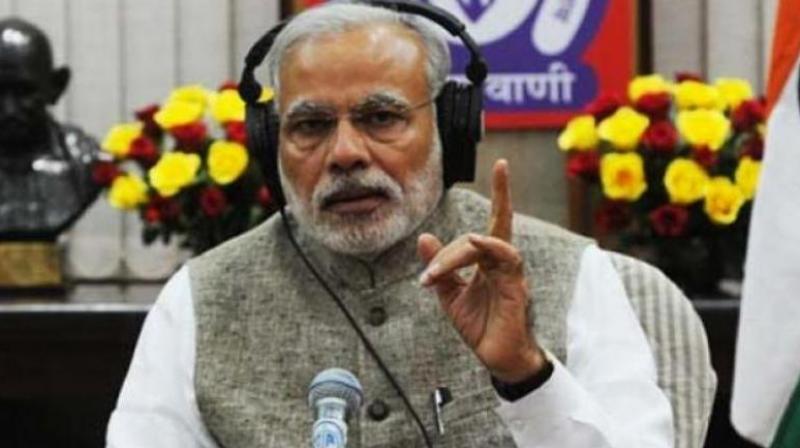It's tough unifying Hindus across the board

Prime Minister Narendra Modi is exhorting the Bharatiya Janata Party’s MPs to reach out to dalits. He wants each BJP MP to spend two nights, around the time of Ambedkar jayanti that falls on April 14, in dalit-dominated villages. Mr Modi has urged them to remind dalits that it was BJP that took measures to honour Ambedkar.
This is a fallout of the recent anti-government protests by dalits, who believe that it is the creeping Hindutva of the last three years that has led to the Supreme Court removing a protection they had under a special law.
The Prime Minister wants to assure them that the BJP has their best interests at heart and therefore, he is asking the MPs to symbolically spend time with them. Is this sufficient?
Let us look at it from the BJP’s point of view as problem-solvers and well-wishers. The party’s aim is to unify all Hindus, politically and culturally. This is its ideology and it actually believes in doing this. How can it go about this?
It is not easy to come to an exact number of “Hindus” because Sikhs and Jains (and now perhaps Lingayat) do not see themselves as Hindus. But let us include all of them anyway and assume that around 85 per cent of our population needs to be united.
It is easier to unify the 85 per cent against the remaining 15 per cent and that is what usually happens on the subcontinent.
Minorities in all South Asian nations get bullied by the unified majority. All minorities whether in Pakistan, Bangladesh, India or Sri Lanka have poor representation in legislatures, government, police, armed forces and even private sector jobs and have the usual problems of finding homes and being treated as the enemy.
But we are not talking about that today. Let us look at the problems of unifying this 85 per cent when there are internal divisions, as the dalit agitation has shown. The reality is that it is not easy to claim unity, even on essential things like language and food and music.
Lata Mangeshkar is easily seen as a pan-India figure though M.S. Subbulakshmi is not. Bollywood and cricket do not interest the Northeast. Nationalism can unify us, but it does so against an outsider. What happens when the problem is internal, within us?
Hindutva wants to include all Hindus but this inclusion happens on Hindutva’s terms. For example, “Hindu” means non-beef eating, preferably vegetarian. The Prime Minister comes from a meat-eating community of Gujaratis but he has chosen to give up that culture and become more RSS-like (meaning more brahminical). This has made him acceptable. Had he been a beef-eating adivasi, it would not have been easy for the RSS to make him the chief minister of Gujarat.
The men who have been RSS chiefs are K.B. Hedgewar, Laxman Paranjape, Guruji Golwalkar, Balasaheb Deoras, Rajendra Singh, K.S. Sudarshan and Mohan Bhagwat. Except for Singh, who was a Thakur, the others are all brahmins. No dalit has ever been RSS head. Perhaps, thinking as a well-wisher of the party, it would be good if the BJP would nudge the RSS to appoint a dalit or an adivasi in real power as Sarsanghachalak, and preferably a dalit or an adivasi woman.
The other problem of unifying all Hindus is that Hindu upper caste is a natural constituency for the BJP, and this core constituency is fundamentally opposed to dalit rights though they might not say it openly.
Does the upper caste support reservations? The answer is no, because reservations to dalits and adivasis come at the expense of this group. This is a division that is so fundamental that it cannot be papered over in the name of Hindu unity. Even within the BJP, there is not a single dalit or adivasi MP who will support the removal of reservations.
The same problem is at the root of the Scheduled Caste and Scheduled Tribes (Prevention of Atrocities) Act. The Supreme Court gave a judgment that the dalits and adivasis have revolted against. These two communities see this law as being a safeguard against their ritual humiliation by the upper caste Hindus.
It is true that this law is followed very poorly and it is difficult to get the police to even register an offence under this law. But even so, on paper it was a safeguard for these two vulnerable groups, which the SC judges have weakened.
On this issue too, the divide is down the line. How many people in the upper castes will oppose the court decision? Not many, because it is the upper caste that is at the receiving end of justice under this law. It empowers dalits and adivasis, something that is unacceptable to many.
In such a situation, “sabka saath” is not possible. The weak can only progress if the strong make concessions. But this is not happening. Observe the number of times the BJP is on the defensive because the RSS chief or someone else has made an anti-reservation comment. The government says it will file a review petition against the Supreme Court but there is no conviction here. It is doing this purely because it is worried. It comes from the same sentiment as asking MPs to spend two nights in a village.
This week I was at an event organised by various groups that want the SC judgment on the SC/ST POA Act reversed. One of the speakers was Communist Party MP D. Raja. Referring to Mr Modi’s comment on the BJP being the party that had honoured Dr Ambedkar, Mr Raja said: “Dr Ambedkar does not need any honouring. What are you doing for dalits?”
That is actually hitting the nail on the head. If the government actually sides with the dalits, they are smart enough to know this. Spending two nights in a village will not be needed.

